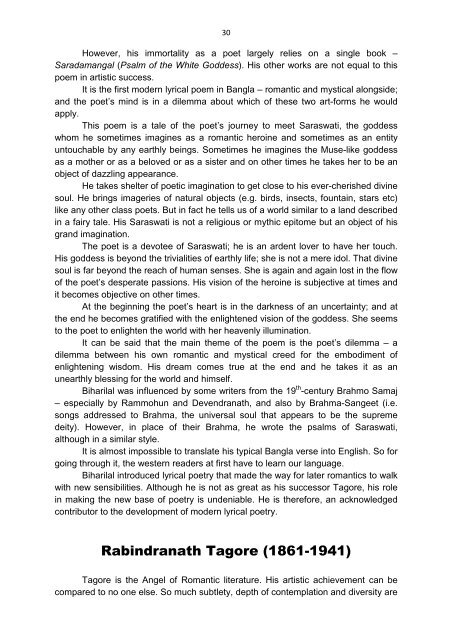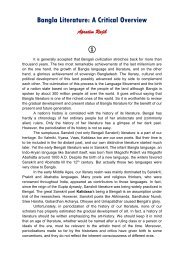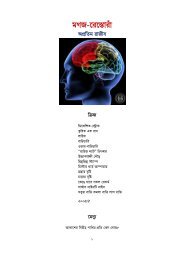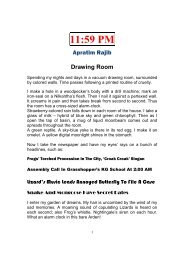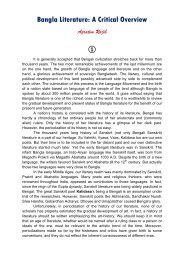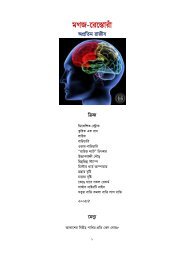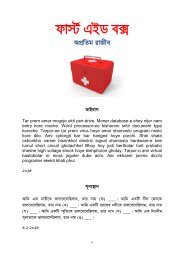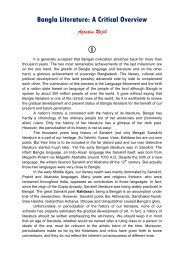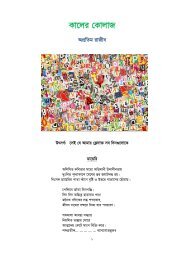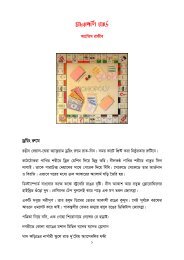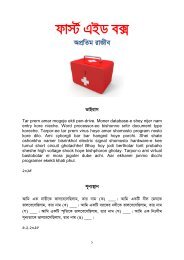Literature-Critique
You also want an ePaper? Increase the reach of your titles
YUMPU automatically turns print PDFs into web optimized ePapers that Google loves.
30<br />
However, his immortality as a poet largely relies on a single book –<br />
Saradamangal (Psalm of the White Goddess). His other works are not equal to this<br />
poem in artistic success.<br />
It is the first modern lyrical poem in Bangla – romantic and mystical alongside;<br />
and the poet’s mind is in a dilemma about which of these two art-forms he would<br />
apply.<br />
This poem is a tale of the poet’s journey to meet Saraswati, the goddess<br />
whom he sometimes imagines as a romantic heroine and sometimes as an entity<br />
untouchable by any earthly beings. Sometimes he imagines the Muse-like goddess<br />
as a mother or as a beloved or as a sister and on other times he takes her to be an<br />
object of dazzling appearance.<br />
He takes shelter of poetic imagination to get close to his ever-cherished divine<br />
soul. He brings imageries of natural objects (e.g. birds, insects, fountain, stars etc)<br />
like any other class poets. But in fact he tells us of a world similar to a land described<br />
in a fairy tale. His Saraswati is not a religious or mythic epitome but an object of his<br />
grand imagination.<br />
The poet is a devotee of Saraswati; he is an ardent lover to have her touch.<br />
His goddess is beyond the trivialities of earthly life; she is not a mere idol. That divine<br />
soul is far beyond the reach of human senses. She is again and again lost in the flow<br />
of the poet’s desperate passions. His vision of the heroine is subjective at times and<br />
it becomes objective on other times.<br />
At the beginning the poet’s heart is in the darkness of an uncertainty; and at<br />
the end he becomes gratified with the enlightened vision of the goddess. She seems<br />
to the poet to enlighten the world with her heavenly illumination.<br />
It can be said that the main theme of the poem is the poet’s dilemma – a<br />
dilemma between his own romantic and mystical creed for the embodiment of<br />
enlightening wisdom. His dream comes true at the end and he takes it as an<br />
unearthly blessing for the world and himself.<br />
Biharilal was influenced by some writers from the 19 th -century Brahmo Samaj<br />
– especially by Rammohun and Devendranath, and also by Brahma-Sangeet (i.e.<br />
songs addressed to Brahma, the universal soul that appears to be the supreme<br />
deity). However, in place of their Brahma, he wrote the psalms of Saraswati,<br />
although in a similar style.<br />
It is almost impossible to translate his typical Bangla verse into English. So for<br />
going through it, the western readers at first have to learn our language.<br />
Biharilal introduced lyrical poetry that made the way for later romantics to walk<br />
with new sensibilities. Although he is not as great as his successor Tagore, his role<br />
in making the new base of poetry is undeniable. He is therefore, an acknowledged<br />
contributor to the development of modern lyrical poetry.<br />
Rabindranath Tagore (1861-1941)<br />
Tagore is the Angel of Romantic literature. His artistic achievement can be<br />
compared to no one else. So much subtlety, depth of contemplation and diversity are


